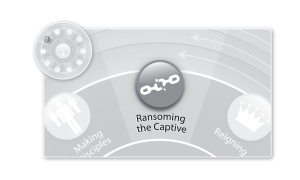 Three Scriptures receive virtually no attention in the study of the Work of Mercy of ransoming the captive and yet are indispensable to it.
Three Scriptures receive virtually no attention in the study of the Work of Mercy of ransoming the captive and yet are indispensable to it.
The first is 1 Timothy 1:12-16 (ESV), where Paul doxologizes:
12 I thank him who has given me strength, Christ Jesus our Lord, because he judged me faithful, appointing me to his service, 13 though formerly I was a blasphemer, persecutor, and insolent opponent. But I received mercy because I had acted ignorantly in unbelief, 14 and the grace of our Lord overflowed for me with the faith and love that are in Christ Jesus. 15 The saying is trustworthy and deserving of full acceptance, that Christ Jesus came into the world to save sinners, of whom I am the foremost. 16 But I received mercy for this reason, that in me, as the foremost, Jesus Christ might display his perfect patience as an example to those who were to believe in him for eternal life.
The second is Ephesians 6:12 (ESV), where Paul contends:
12 For we do not wrestle against flesh and blood, but against the rulers, against the authorities, against the cosmic powers over this present darkness, against the spiritual forces of evil in the heavenly places.
The third is Galatians 6:1 (ESV), where Paul exhorts:
Brothers, if anyone is caught in any transgression, you who are spiritual should restore him in a spirit of gentleness. Keep watch on yourself, lest you too be tempted.
Put these all together and you get a fascinating–and fascinatingly neglected–3D Scriptural portrait of the Work of Mercy of ransoming the captive.
Rewind back to the first Scripture, 1 Timothy 1:12-16. Paul is referencing his Saul days, when he mercilessly persecuted the body of Christ. Did Jesus ransom the Christians who were captive to Saul? Yes. How?
By ransoming Saul himself.
Ephesians 6:12 explains why. It reminds us of an oft-forgotten or overlooked aspect of ransoming: The Work of ransoming goes deeper than the physical. Human beings don’t–can’t–control the power of sin and death, despite what we humans like to believe. Absent Christ’s intervention, sin and death control us. That is, the principalities and powers eat us for lunch.
The good news is that Christ’s death for sinners means full ransom for captives, not just the partial ransom of bodily freedom. As Jesus himself says (in Matthew 10:28), “And do not fear those who kill the body but cannot kill the soul. Rather fear him who can destroy both soul and body in hell.”
When you put on these 3D glasses, captivity is fully unmasked: The captor, ultimately, is just another captive, despite what he wants to believe (and what he wants you to believe as he snarls at you menancingly, too). Saul, the captor of Christians, is revealed as Saul, the captive of sin. If Christ were to ransom the Christians but leave Saul captive, that would still be impressive. But as Paul points out in Romans 5:6-8 (ESV), Christ moves beyond impressive to downright divine:
6 For while we were still weak, at the right time Christ died for the ungodly. 7 For one will scarcely die for a righteous person—though perhaps for a good person one would dare even to die— 8 but God shows his love for us in that while we were still sinners, Christ died for us.
Christ, in other words, regularly moves in a way contrary to human sight, understanding, and inclination, ransoming the one who is most captive, the captor himself. Reveal the captivity of the captor to the captor himself, set him free in Christ, and it is the captor himself who ministers to those whom he has been holding.
It’s a recurring theme in Scripture, like in the story of Paul and Silas and the Philippian jailer in Acts 16:25-34 (ESV):
25 About midnight Paul and Silas were praying and singing hymns to God, and the prisoners were listening to them, 26 and suddenly there was a great earthquake, so that the foundations of the prison were shaken. And immediately all the doors were opened, and everyone’s bonds were unfastened. 27 When the jailer woke and saw that the prison doors were open, he drew his sword and was about to kill himself, supposing that the prisoners had escaped. 28 But Paul cried with a loud voice, “Do not harm yourself, for we are all here.” 29 And the jailer called for lights and rushed in, and trembling with fear he fell down before Paul and Silas. 30 Then he brought them out and said, “Sirs, what must I do to be saved?” 31 And they said, “Believe in the Lord Jesus, and you will be saved, you and your household.” 32 And they spoke the word of the Lord to him and to all who were in his house. 33 And he took them the same hour of the night and washed their wounds; and he was baptized at once, he and all his family. 34 Then he brought them up into his house and set food before them. And he rejoiced along with his entire household that he had believed in God.
And as we’ll see in our next post, it’s not a practice Christ discontinued once the Bible Days drew to a close.











I think there are many who do not even connect the truths of Ransoming and mercy unfortunately. I agree – the war with our true enemy is often forgotten in the work of mercy..